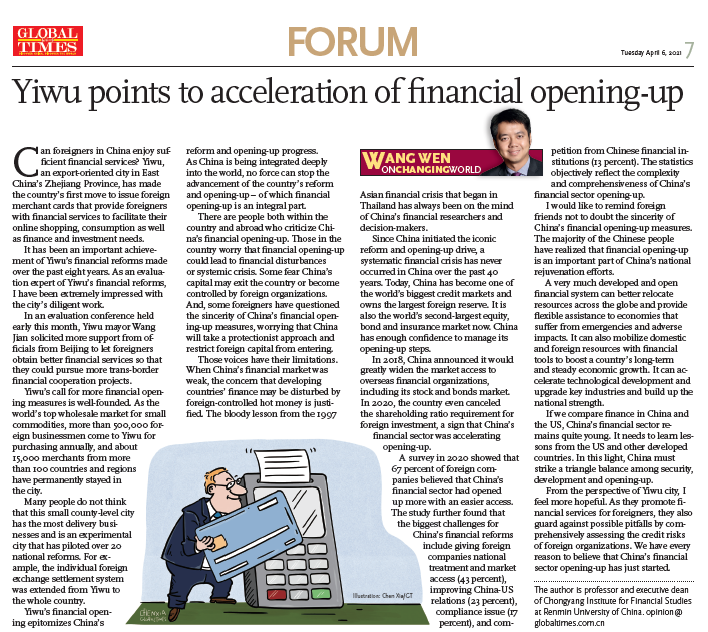Picture
Your Present Location: HOME> PictureWang Wen: Yiwu points to acceleration of financial opening-up
By Wang Wen Source: Global Times Published: 2021-04-06

Can foreigners in China enjoy sufficient financial services? Yiwu, an export-oriented city in East China's Zhejiang Province, has made the country's first move to issue foreign merchant cards that provide foreigners with financial services to facilitate their online shopping, consumption as well as finance and investment needs.

It has been an important achievement of Yiwu's financial reforms made over the past eight years. As an evaluation expert of Yiwu's financial reforms, I have been extremely impressed with the city's diligent work.
In an evaluation conference held early this month, Yiwu mayor Wang Jian solicited more support from officials from Beijing to let foreigners obtain better financial services so that they could pursue more trans-border financial cooperation projects.
Yiwu's call for more financial opening measures is well-founded. As the world's top wholesale market for small commodities, more than 500,000 foreign businessmen come to Yiwu for purchasing annually, and about 15,000 merchants from more than 100 countries and regions have permanently stayed in the city.
Many people do not think that this small county-level city has the most delivery businesses and is an experimental city that has piloted over 20 national reforms. For example, the individual foreign exchange settlement system was extended from Yiwu to the whole country.
Yiwu's financial opening epitomizes China's reform and opening-up progress. As China is being integrated deeply into the world, no force can stop the advancement of the country's reform and opening-up - of which financial opening-up is an integral part.
There are people both within the country and abroad who criticize China's financial opening-up. Those in the country worry that financial opening-up could lead to financial disturbances or systemic crisis. Some fear China's capital may exit the country or become controlled by foreign organizations. And, some foreigners have questioned the sincerity of China's financial opening-up measures, worrying that China will take a protectionist approach and restrict foreign capital from entering.
Those voices have their limitations. When China's financial market was weak, the concern that developing countries' finance may be disturbed by foreign-controlled hot money is justified. The bloody lesson from the 1997 Asian financial crisis that began in Thailand has always been on the mind of China's financial researchers and decision-makers.
Since China initiated the iconic reform and opening-up drive, a systematic financial crisis has never occurred in China over the past 40 years. Today, China has become one of the world's biggest credit markets and owns the largest foreign reserve. It is also the world's second-largest equity, bond and insurance market now. China has enough confidence to manage its opening-up steps.
In 2018, China announced it would greatly widen the market access to overseas financial organizations, including its stock and bonds market. In 2020, the country even canceled the shareholding ratio requirement for foreign investment, a sign that China's financial sector was accelerating opening-up.
A survey in 2020 showed that 67 percent of foreign companies believed that China's financial sector had opened up more with an easier access. The study further found that the biggest challenges for China's financial reforms include giving foreign companies national treatment and market access (43 percent), improving China-US relations (23 percent), compliance issue (17 percent), and competition from Chinese financial institutions (13 percent). The statistics objectively reflect the complexity and comprehensiveness of China's financial sector opening-up.
I would like to remind foreign friends not to doubt the sincerity of China's financial opening-up measures. The majority of the Chinese people have realized that financial opening-up is an important part of China's national rejuvenation efforts.
A very much developed and open financial system can better relocate resources across the globe and provide flexible assistance to economies that suffer from emergencies and adverse impacts. It can also mobilize domestic and foreign resources with financial tools to boost a country's long-term and steady economic growth. It can accelerate technological development and upgrade key industries and build up the national strength.
If we compare finance in China and the US, China's financial sector remains quite young. It needs to learn lessons from the US and other developed countries. In this light, China must strike a triangle balance among security, development and opening-up.
From the perspective of Yiwu city, I feel more hopeful. As they promote financial services for foreigners, they also guard against possible pitfalls by comprehensively assessing the credit risks of foreign organizations. We have every reason to believe that China's financial sector opening-up has just started.
The author is professor and executive dean of Chongyang Institute for Financial Studies at Renmin University of China.
Please Find us: Twitter: RDCYINST YouTube: RealRDCY LinkedIn: 人大重阳RDCY Facebook: RDCYINST Instagram:
Key Words: China; export; Wang Wen; Global Times























































































 京公网安备 11010802037854号
京公网安备 11010802037854号





